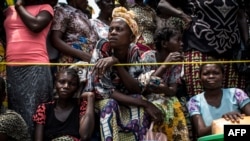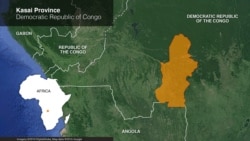The U.N. refugee agency warns that renewed violence and tensions in the Democratic Republic of Congo’s Kasai province could trigger a new wave of mass displacement.
More than 24,000 people in troubled Kasai province have fled violent attacks and gross human rights atrocities in the past month. UNHCR says people have continued to flee even after a period of uneasy calm.
The UNHCR says conflicts related to land disputes and resources, as well as confrontations among different ethnic groups, authorities and militias have triggered this recent displacement.
The agency is calling for a renewed focus on peace and a lessening of tensions.
UNHCR spokesman Babar Baloch told VOA efforts to maintain peace need to be redoubled to prevent this explosive situation from getting completely out of hand.
“The situation has been fragile, tensions were there, but this is kind of a new spark, which could bring in another massive displacement in a country that has already seen millions of people being displaced in the other parts of the country, but also in the Kasai regions as well,” Baloch said.
In 2017, violence in the Kasai province displaced 1.4 million people within the DRC and prompted some 35,000 refugees to flee to neighboring Angola in search of safety.
Baloch said the majority of those fleeing the current wave of violence are seeking refuge on the provincial border areas of Demba region in Kasai Central and Mweka region in the Kasai.
“The newly displaced report killings, rape, torture, looting and burning of the homes in the recent weeks. Dozens of people have arrived with injuries. There are many children, women and elderly among the newly displaced,” he said.
Baloch said UNHCR staff on the ground are helping the survivors of sexual violence and referring them for medical care and psycho-social support. He said the agency is distributing relief items, including plastic sheeting, blankets, soap and cooking kits to more than 4,000 people.
He said thousands of displaced also have received shelter kits and cash to buy food and meet other urgent needs. However, he noted much more aid is needed, which his agency is unable to provide because of a lack of money.
He said he hopes the international community will support the UNHCR’s humanitarian operation so it can respond to the essential needs of displaced Congolese in the region.
Renewed Violence in DRC's Kasai Region Could Trigger Mass Displacement, UN Says
- By Lisa Schlein





